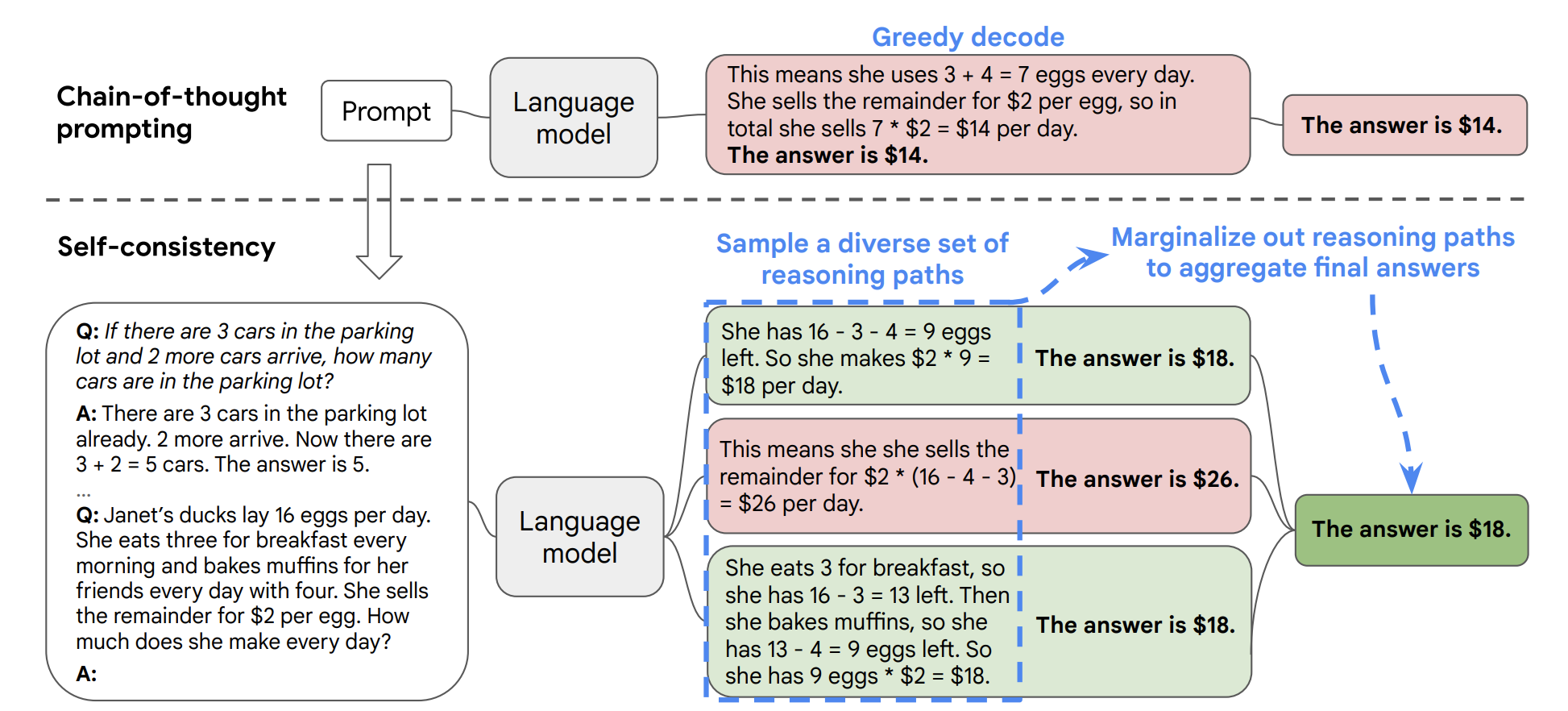Self-Consistency 自洽是对 Chain of Thought 的一个补充,它能让模型生成多个思维链,然后取最多数答案的作为最终结果。
按照 Xuezhi Wang 等人在 2022 年发表的论文 表明。当我们只用一个逻辑链进行优化时,模型依然有可能会算错,所以 XueZhi Wang 等人提出了一种新的方法,让模型进行多次运算,然后选取最多的答案作为最终结果:

就我目前使用下来,在 ChatGPT 上,其自洽性非常高,暂时没有遇到过出现多种答案的情况。查阅多份资料,我发现这个自洽性可能更多的用于评估模型的优劣,好的模型一般自洽性会比较高。
在此案例中,考虑如下多步推理问题:
Consider a multi-step reasoning problem like the following:
Question: If a store has 10 apples and 8 oranges, and it sells 6 apples and 4 oranges, how many fruits are left in the store?
Instead of directly answering the question, the chain-of-thought prompting would require the language model to produce a series of short sentences that mimic a human's reasoning process:
The store has 10 apples.
The store has 8 oranges.
6 apples are sold.
4 oranges are sold.
There are 10 - 6 = 4 apples left.
There are 8 - 4 = 4 oranges left.
The store now has 4 apples + 4 oranges = 8 fruits.
Using self-consistency, the language model generates multiple reasoning paths:
Reasoning Path A:
The store has 10 apples.
The store has 8 oranges.
6 apples are sold.
4 oranges are sold.
There are 10 - 6 = 4 apples left.
There are 8 - 4 = 4 oranges left.
The store now has 4 apples + 4 oranges = 8 fruits.
Reasoning Path B:
The store initially has 10 apples and 8 oranges.
It sells 6 apples, so there are 10 - 6 = 4 apples left.
It sells 4 oranges, so there are 8 - 4 = 4 oranges left.
The store now has 4 apples + 4 oranges = 8 fruits.翻译过来则为:
问题:如果一家商店有 10 个苹果和 8 个橙子,此时店里卖出了 6 个苹果和 4 个橙子,那么店里还剩下多少水果?
思维链提示(chain-of-thought prompting)不是直接回答问题,而是要求语言模型生成一系列模仿人类推理过程的短句:
商店有 10 个苹果。
店里有 8 个橙子。
卖了 6 个苹果。
卖了 4 个橙子。
还剩下 10 - 6 = 4 个苹果。
剩下 8 - 4 = 4 个橙子。
商店现在有 4 个苹果 + 4 个橙子 = 8 个水果。使用 Self-consistency,语言模型生成多个推理路径:
推理路径A:
商店有 10 个苹果。
店里有 8 个橙子。
卖了 6 个苹果。
卖了 4 个橙子。
还剩下 10 - 6 = 4 个苹果。
剩下 8 - 4 = 4 个橙子。
商店现在有 4 个苹果 + 4 个橙子 = 8 个水果。
推理路径 B:
商店最初有 10 个苹果和 8 个橙子。
商店卖了 6 个苹果,所以还剩下 10 - 6 = 4 个苹果。
商店卖了 4 个橙子,所以还剩下 8 - 4 = 4 个橙子。
商店现在有 4 个苹果 + 4 个橙子 = 8 个水果。Self-consistency 从生成的多个推理路径中选择最一致的答案。在这个例子中,推理路径 A 和 B 都得出相同的答案(8 个水果)。可以看到这种做法增加了模型对最终答案正确的信心。
相关文章
暂无评论...